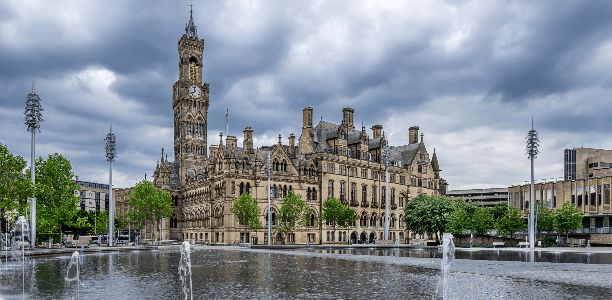Will City of Culture 2025 change Bradford’s fortunes?

Hull, Coventry, now Bradford. But does ‘City of Culture’ status actually change anything for post-industrial English cities?
Bradford Council’s forecasts
Bradford Council forecasts that 7,000 new jobs will be created, and a likely visitor spend of £700 million. By 2030, Bradford’s City of Culture legacy is predicted to return on the council’s overall investment by £26 to every £1. The local economy is expected to see a boost of £365 million GVA.
What money has come in so far?
In May 2022, Bradford won the title and £275,000 from central government.
London 2012 legacy funder, Spirit of 2012 awarded Bradford Council £250,000 to the volunteer programme for UK City of Culture 2025, recruiting 1,750 volunteers.
As part of its status as UK City of Culture 2025, Bradford will be eligible for a £3 million grant from The National Lottery Heritage Fund.
Bradford will also be looking for grants from the Arts Council (Coventry received £6 million) and the DCMS (again, Coventry received £7 million).
£20 million has been secured from the government’s Levelling Up fund to invest in the Squire Lane Wellbeing and Enterprise Centre.
A £4 million DCMS grant will redevelop the Bradford Odeon into the 4,000 seat live music and entertainment venue: ‘Bradford Live’ (developed by AWB Charlesworth client, RN Wooler no less.)
A £58 million investment offer has been secured for Shipley and Keighley from the government’s Towns Fund.
Hull, Coventry and Londonderry’s experience
Hull’s year as the UK City of Culture (2017) attracted more than five million people, £220m of investment and 800 new jobs. A net increase of 80 new businesses opened that year and according to a Hull University report, one in four Hull businesses recruited new staff, and tourism increased by £15 million. German manufacturing giant, Siemens announced a £160m investment in an offshore wind facility in Hull’s Alexandra Dock.
A similar situation happened in Londonderry. Overnight stays soared in 2013 (the year of their City of Culture) to 254,000 compared with 165,000 the previous year, an increase of 54%. Michael Gallagher, the city’s chief economist said to the BBC: “The reputational improvement and visibility of the city are the single biggest long-term impacts of being City of Culture.” For a city known for the ‘troubles’ and 1,000 British troops deployed on the streets, this reputational rebrand was vitally important.
When Coventry became the City of Culture in 2021, it saw more than £172m invested in funding music concerts, public art displays, a new children’s play area in the centre of the city and improvements to public transport. Nearby the UK’s largest industrial facility (a gigafactory) is being built for the manufacture of EV batteries. Coventry and Hull are both benefiting from high-tech, green tech.
How Bilbao recovered through cultural regeneration
Bilbao is often considered to be the poster child of regeneration through culture. With an economy based on heavy industries such as shipbuilding, steel and engineering, it fell into a major depression in the 70s and 80s; by 1985, this once wealthy region had one of the highest unemployment rates in the EU.
Today, however the area is one of the most prosperous and innovative areas in Spain and is in the top 25% of OECD regions in terms of average household income. The building of the Guggenheim Museum as a cultural centre was one part of the regeneration. But alongside there were other successful strategies: technological upgrading of existing firms, a gradual diversification into more knowledge-intensive sectors, a very visible urban renewal, local agency and accountability, and long-term funding.
A salutary warning from the Centre for Cities
The Centre for Cities stresses that cities that succeed have “a strong ‘exporting’ sector”. This then raises demand for local services, and then culture. They argue that the causation is in reverse to that of the City of Cultures. Not culture first, culture last. Their research suggests that for every 10 new high-skilled ‘exporting’ jobs created, 17 new lower-skilled local service jobs were generated.
“An increase in tourism, civic pride and business activity”
In March, Jawad Iqbal of The Spectator wrote dismissively in his article, ‘It’s time to end the City of Culture charade’. He complained about the lack of tangible and lasting benefits, saying that the City of Culture only offered “an increase in tourism, civic pride and business activity.” For Bradford, that would be a good result indeed!
So, what about Bradford?
City of Culture status allows a city a rebrand; Bradford could benefit from a change in perception. But without ‘exporting businesses’ the cultural uplift may not be permanent. Hull and Coventry have seen investment from high-tech, green tech that should only expand and attract ancillary industries around it. Bradford needs to see that type of business too.
In its favour, Bradford has a young population, a thriving digital sector, and has been identified as the best place in the UK to start a business by the Barclays Bank SME Growth Factors Index. The Sunday Times listed Bradford in the Top 20 Cities for business growth in 2020, it exports £2bn a year and has a powerful culture of entrepreneurship. The council has a strong strategy for growth, utilising the benefits of the City of Culture status. Meanwhile, Bradford’s Literature Festival goes from strength to strength, delivering audience diversity and reaching out to disadvantaged people in a way many similar festivals, don’t.
Will the City of Culture 2025 status change Bradford’s fortunes? It certainly has the potential to do so. It will give Bradford prominence not just in 2025, but in the build-up. Bradford Live will launch in 2024 and will create a world-class leisure and business destination. That in itself is something we should be very proud of. Not so long ago the Odeon was an abandoned wreck destined for demolition. The passion and determination of Bradfordians saved it; the passion and determination of Bradfordians won the City of Culture. Hopefully the passion and determination of Bradfordians will generate longer term change for the future.
For more information, on AWB Charlesworth’s services in commercial and company law, please contact Usmaan Ahmed on 01535 613670 or email usmaan.ahmed@awbclaw.co.uk

8 June 2023
Sources
https://bradford2025.co.uk/about/
https://www.bradford.gov.uk/business/bradford-economy/about-bradfords-economy/
https://www.centreforcities.org/blog/city-of-culture-award-urban-economic-renaissance/
https://www.bbc.co.uk/news/uk-england-43485141
https://www.agenda21culture.net/sites/default/files/files/cities/content/bilbao-eng_def.pdf
https://www.agenda21culture.net/sites/default/files/files/cities/content/bilbao-eng_def.pdf
https://golab.bsg.ox.ac.uk/documents/Format_Bilbao_case_study.pdf
